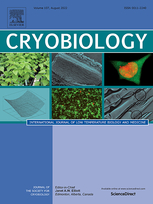
Summary
The cryptobiotic eutardigrade Adorybiotus coronifer survives cooling to -196 deg C in the hydrated state, showing decreasing viability with faster cooling rates. The dissaccharide trehalose may have some cryoprotective effect. Cooling at 30 K/min to an intermediate temperature greater than the ice crystallization temperature of the sample before shock cooling to -196 deg C is lethal, whereas cooling at a rate of 30 K/min to an intermediate temperature less than the ice crystallization temperature of the sample before shock cooling to -196 deg C achieved a survival of about 55%. This is similar to the survival of animals cooled to -196 deg C at a constant rate of 30 K/min. The data support the hypothesis that the freeze tolerance exhibited by A. coronifer is closely related to its ability to be in the state of anhydrobiosis.
Details
- Original title: Survival of the cryptobiotic eutardigrade Adorybiotus coronifer during cooling to -196 deg C: effect of cooling rate, trehalose level, and short-term acclimation.
- Record ID : 1993-0518
- Languages: English
- Source: Cryobiology - vol. 29 - n. 1
- Publication date: 1992/02
Links
See other articles in this issue (8)
See the source
Indexing
-
Cryopreservation of living organs.
- Author(s) : TANASAWA I., NAGATA S., KIMURA N.
- Date : 1993
- Languages : Japanese
- Source: Trans. JAR - vol. 10 - n. 1
View record
-
Effects of low temperatures on viability of Cry...
- Author(s) : FAYER R., NERAD T.
- Date : 1996/04
- Languages : English
- Source: Appl. environ. Microbiol. - vol. 62 - n. 4
View record
-
Preservation of Haemophilus influenzae and Haem...
- Author(s) : VOTAVA M., STRÍTECKÁ M.
- Date : 2001/08
- Languages : English
- Source: Cryobiology - vol. 43 - n. 1
View record
-
Refrigerated storage over several years of micr...
- Author(s) : BEUTLING D.
- Date : 1994
- Languages : German
- Source: Arch. Lebensmittelhyg. - vol. 45 - n. 1
View record
-
A SIMPLE TECHNIQUE FOR CRYOPRESERVATION OF THE ...
- Author(s) : MARCIN A.
- Date : 1989/03
- Languages : English
- Source: Cryo-Letters - vol. 10 - n. 2
View record
